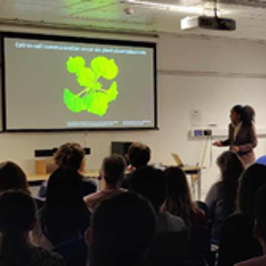
Sponsored Seminar Series Grants
Our Sponsored Seminar Series Grant assist with the costs associated with hosting a seminar series within your institution.
The intended lectures must help us with our goal of promoting the future of molecular biosciences; facilitating the sharing of expertise, supporting the advancement of biochemistry and molecular biology, and raising awareness of their importance in addressing societal grand challenges.
The grant is intended to help with the travel costs for guest speakers at a series of seminars or lectures throughout the year. The grant can also be used to assist with catering costs should any refreshments be provided with the lectures or seminars.
Grants of £500, £750, £1000 or £1500 will be awarded to successful applicants.
“We at the Norwich Research Park are very grateful to the Biochemical Society for sponsoring our ‘Environmental Interactions’ series. We established this seminar series to bring scientists together across the NRP, highlight the shared research interests, encourage collaboration, and promote biochemical research. All sessions were well received, with some early career researchers suggesting that they would keep in touch with the speaker for future collaborations!
“

Sponsored Seminar Series Grant recipient
Hear from a Grants Committee member
Members of our Grants Committee took part in a Biochemistry Focus webinar titled 'How to apply for Biochemical Society grants'.
Hear from Professor Ian Wood, who discusses what to include in a Sponsored Seminar Series Grant application.
Contact us
For further information please get in touch with the Grants department.
Related grants
Find out more about related funding opportunities









